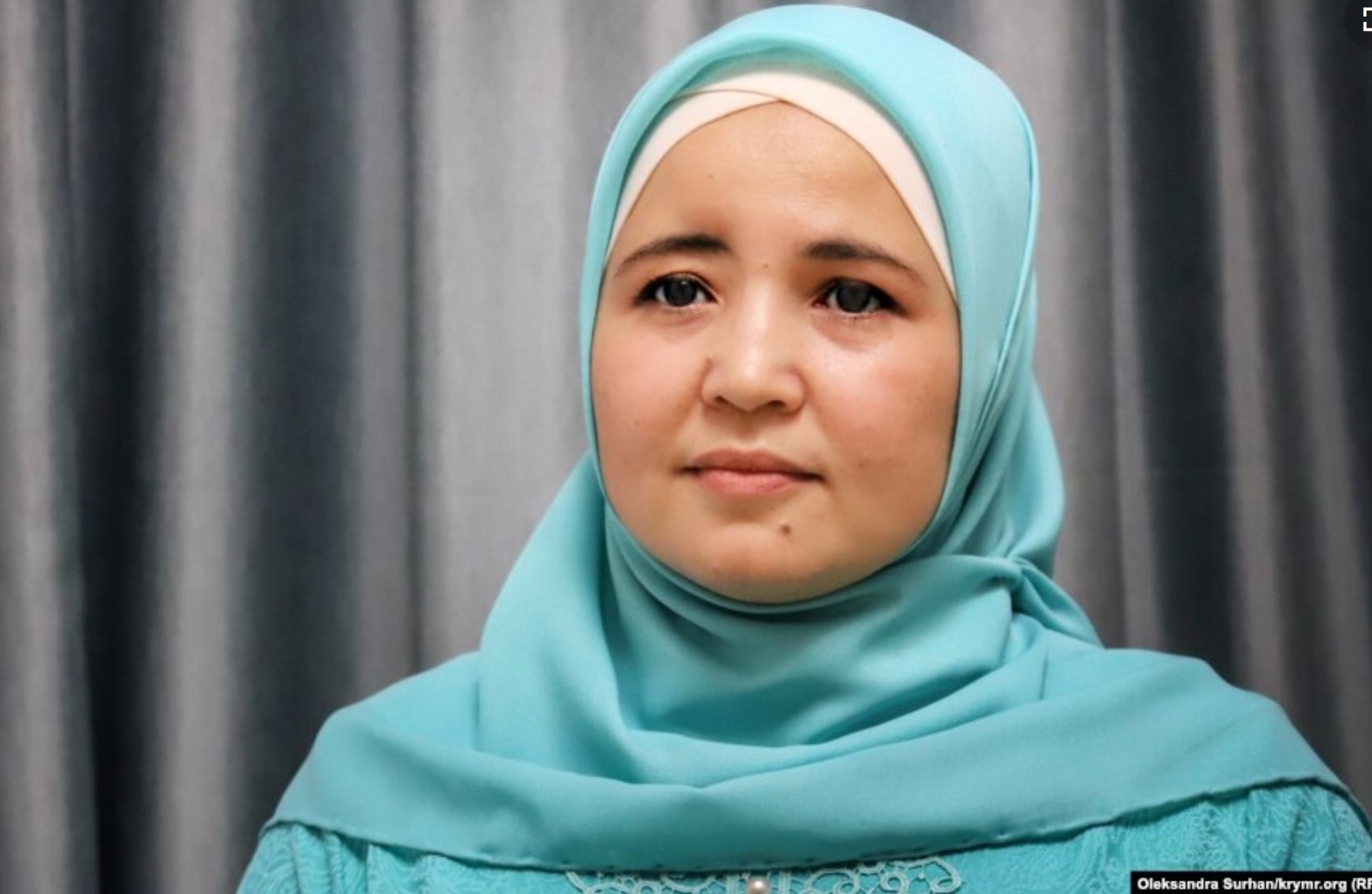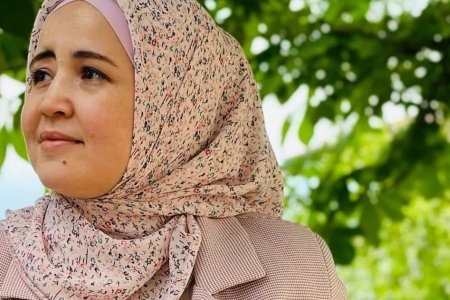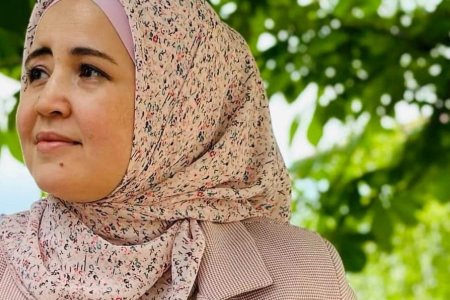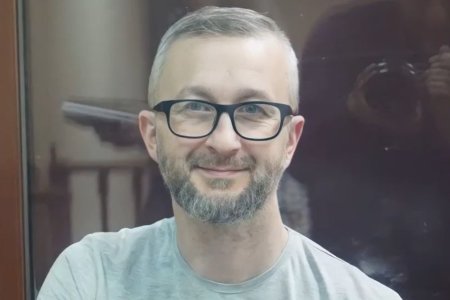
The occupation ‘Kievsky district court’ has found Lutfiye Zudiyeva guilty of ‘abuse of freedom of mass information’ over a post on the renowned Crimean Tatar human rights activist and journalist’s personal Facebook page. The imitation of a ‘court hearing’ on 20 March took all of eight minutes and was held in Zudiyeva’s absence.
This first conviction comes almost exactly a month after Russia’s so-called ‘centre for countering extremism’ carried out an armed raid and search of the journalist’s home before taking her away for interrogation. She was later released, after protocols were drawn up under Articles 13.15 § 2 and 13.15 § 2.1 of Russia’s code of administrative offences, over three Facebook posts from 2021 and 2022. It seems, however, that the ‘hearing’ on 20 March was over the initial charge under Article 13.15 § 2.1 on 21 February, the day before the armed raid.
Despite claiming to prosecute for something termed ‘abuse of freedom of mass information’, these administrative charges are among many norms used as a method of repression. On most of the posts in question, the journalist had mentioned or posted material mentioning Radio Svoboda, or Radio Free Europe [RFE/R;] without indicating that this has been forcibly registered as a so-called ‘foreign agent’ in Russia and on occupied Ukrainian territory. In another text, Zudiyeva did not mention that Hizb ut-Tahrir, a peaceful, transnational Muslim organization, which is legal in Ukraine, has been declared ‘terrorist’ in Russia.
The ‘hearing’ on 20 March was over the first of two charges under Article 13.15 § 2.1, with the alleged ‘abuse of freedom of mass information’ in the fact that a text on a personal Facebook page did not mention that Russia calls RFE/RL a ‘foreign agent’.
Not only was the ‘hearing’ held without Zudiyeva’s presence, but her written objections to the administrative charge were not examined. She insists that, as an individual, she was not obliged to fulfil the demand that all references to RFE/RL mention that Russia has labelled it a ‘foreign agent’. By bringing such a charge against her, Zudiyeva argued, the head of the ‘centre for countering extremism’, Ruslan Shambazov had effectively treated her personal Facebook page as a registered media. The charge brought against her should only be laid against a media editorial office, the media founders or chief editor. There is nothing in the relevant article to require that individuals on their personal social media pages specially indicate that they are referring to a media, etc., labelled as a ‘foreign agent’.
Zudiyeva was a few minutes late because of a road accident and resulting traffic jams and had, via her lawyer, informed the ‘court’ of this. ‘Judge’ Yekaterina Chumachenko chose to ignore circumstances clearly beyond Zudiyeva’s control, and to claim that the latter had shown contempt of the court. Zudiyeva told Crimean Solidarity that she would include all of the arguments that she had been prevented from presenting at the ‘hearing’ in her appeal.
In his address to the ‘court’, lawyer Emil Kurbedinov insisted that the ‘centre for countering extremism’ officials had overstepped their jurisdiction in laying such charges, which are the prerogative of bodies empowered to oversee the work of the media.
Chumachenko claimed that such arguments “do not warrant attention” and, within eight minutes, had found Lutfiye Zudiyeva ‘guilty’ of the charges, imposing a (relatively small) 2,500 rouble fine.
Zudiyeva had planned to draw attention to the methods of ‘monitoring’ used by ‘Centre’ head Ruslan Shambazov, deputy head Alexander Kozhushny and Roman Filatov. Shambazov and Filatov are notorious for their role in political persecution of Crimean Solidarity journalists and activists, as well as of lawyers, defending political prisoners. In this case, Shambazov was clearly looking for something ‘to pin on’ Zudiyeva and had typed in her name, searching under ‘Crimean Tatar’; ‘Radio Free Europe’ and ‘torture’.
Zudiyeva notes that such administrative prosecutions are typical practice in Crimea as a method of putting pressure on journalists, lawyers, civic activists and human rights defenders. “Some of them have fines imposed, others are jailed in the hope that people will voluntarily leave Crimea or totally stop their activities and not report on the events that are taking place in the peninsula.”
Lutfiye Zudiyeva was one of the Crimean Tatars who responded in 2016 to Russia’s mounting repression in occupied Crimea and initiated the Crimean Solidarity human rights movement. Very many of her male colleagues were first subjected to various administrative prosecutions and then, when they refused to be silenced, were arrested and are now, themselves, political prisoners.
As well as her vital work for Crimean Solidarity, Zudiyeva is also a correspondent for the Graty journalist initiative and is well-known far beyond Ukraine. This has clearly made her a target for Russia’s repressive regime, although the fact that she is a mother with young children has, thus far, protected her from the worst of Russia’s excesses.
On 30 May 2019, Zudiyeva and fellow Crimean Solidarity and Crimean Childhood activist, Mumime Saliyeva, were detained, with Zudiyeva prosecuted and fined for three Facebook posts which she had had nothing to do with, but which somebody had tagged her on when posting five years earlier.
On 27 July 2023, Zudiyeva was one of two journalists detained while trying to attend and report on a supposedly open ‘court’ appeal hearing against the appalling politically motivated sentences passed on Nariman Dzhelyal, Asan Akhtemov and his cousin, Aziz Akhtemov. Although she had been illegally detained while present in her journalist capacity, she was fined.
Shambazov & Co. burst into Zudiyeva’s home at around 6 a.m. on 22 February 2024. Lutfiye’s husband, Seitasan Chykiyev, reported that the men had had a warrant from the occupation ‘Kievsky district court’ in Simferopol to carry out “an inspection”. This was a procedural ploy, since ‘investigations’ require less formal grounds, though in fact the officers proceeded to carry out a fully-fledged search of the house, rummaging around everywhere and demanding that Chykiyev pull things out for them to examine. Kurbedinov arrived, as Zudiyeva’s lawyer, at around 8 a.m. but was, typically, prevented from being present. The armed officers outside also stopped neighbours and relatives from entering and ostentatiously videoed them standing by the gate.
The officers removed a video register, all telephones, Zudiyeva’s laptop and flash drives, as well as two books. One of the latter was a collection of letters and texts by Crimean Tatar Mejlis leader and political prisoner Nariman Dzhelyal, the other - a collection of lectures mainly given by Russian human rights defenders, but also containing a lecture given by Zudiyeva about political persecution in Crimea.
As mentioned the charges under Articles 13.15 § 2 and 13.15 § 2.were all over 2021 and 2022 Facebook posts. The earliest dated back to 10 January 2021 and reported on various measures throughout local Crimean Tatar communities in support of three political prisoners – Enver Omerov (then 59), his son Riza Omerov and Aider Dzhapparov. Zudiyeva’s post was on the eve of horrific sentences (18, 13 and 17 years, respectively) on the basis of conversations about religion and entirely unproven claims that the men ‘organized’ or ‘took part’ in a Hizb ut-Tahrir group. The three men are all recognized internationally as political prisoners, and Russia’s abuse of its ‘terrorism’ legislation has been widely condemned. Nonetheless, over three years later, Lutfiye Zudiyeva has been charged over her failure to preface mention of Hizb ut-Tahrir by noting that it is outlawed as ‘terrorist’ in Russia.
The second, posted on 16 February 2022, reported the internationally condemned sentence against Vladyslav Yesypenko, a Ukrainian freelance journalist who was seized, tortured and then ‘sentenced’ to 6 years on surreal charges while carrying out work in occupied Crimea for RFE/RL’s Crimean Realities. The charge here is, presumably, because Zudiyeva gave a link to an article, written by Anton Naumliuk, about the sentence on Graty, since in her preface to this, she does not mention for whom Yesypenko was working at all.
The most recent of the three posts still dated back to 6 August 2022 and was about Russia’s offensive against three Crimean Tatar lawyers, all involved in defending Crimean Tatar political prisoners. As reported, the three: Lilia Hemedzhy; her husband Rustem Kyamilev and Nazim Sheikhmambetov were all stripped of their licence to practise without any legitimate grounds. Zudiyeva mentioned other persecution of lawyers both in Russia and in Belarus, with the post mentioning the Belarusian Service of Radio Free Europe (without calling the latter a ‘foreign agent’).



